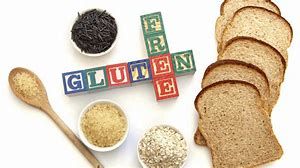Diet
To 'Gluten' or 'Not Gluten': (For Your Kids, I Mean!)
In this day and age of 'gluten bashing' parents need be careful of diet traps
Posted March 18, 2018

Okay, okay, I know this is not a verb, like to “google”, but with the amount of press lately and converts to gluten free diets, it may enter our worlds as a verb in the near future!
I had recently been asked to comment on the ‘gluten’ question regarding kids and their diet, and I know that there are many families who follow the gluten free path for a variety of reasons; concern re: gluten 'intolerance', and celiac disease, which is far more rare.
Now I have to confess that when it comes to food and adults, I am a big believer in the old adage: "Whatever works for you!" In fact, I always think that in fact you are not failing your diet, your diet is failing you. There is no "ONE SIZE FITS All" when it comes to eating; each person needs to find their own way and what works for their body and for their lifestyle. (More to come on that in another blog!)
However, parents are often quick to think that if they have a problem with food, that their children will benefit from that restriction and we can all be tempted to feel convinced that what works for us would work for our kids. Putting kids on restrictive diets without any clear medical problems has its risks and can create a problem of compulsive eating for that child, when they are exposed to the foods they're restricted from outside of their own home amongst other potential problems.
Important disclaimer here: I am not a nutritionist. I am a psychotherapist with specialized training in eating disorders, child development, and human behavior. However, in the 30 odd years that I’ve been practicing, I have received a lot of information from nutritionists; particularly while researching my book to help parents prevent eating problems from developing. As such, I will be commenting on the issue from this vantage point and I am happy to share some of the anecdotal information I have received from nutritionists I spoke with recently while teaching at Harvard Medical School’s Eating Disorder Conference.
Basically in a nutshell, the message goes like this:
Unless a child has a specific medical problem that indicates the necessity to eat gluten free, it is not at all recommended.
That being said, there definitely are medical conditions that result in kids needing to have restrictions in their diet. I was just brought in to consult with the Mount Sinai Hospital Pediatric Metabolic Disorders team, as they were struggling with patients who have severe medical illnesses requiring them to follow a highly specific and restrictive diet.
This necessity, while absolutely vital to a child’s development and even survival, presents kids and their families with very specific problems, and often results in major non compliance; rebellion, fighting between kids and parents, frustration, fear, and severe eating disorders.
A lot of great care and work needs to be done in order to help these families work out preparing restrictive diets, especially while kids grow, develop, have play dates, and only want to fit in and eat what other kids eat.
Obviously if a restrictive diet is an absolute necessity, this is a non issue. I have worked with many families and kids who have differing medical conditions specifically on the problems that arise when a child has to follow a restrictive diet. It is vital to help kids and parents navigate problems, with the goal of taking the stress and anxiety out of feeding, while at the same time empowering the kids to help them develop, grow, and be able to make independent decisions and take the best care of their bodies.
So take it for what it is and of course most importantly you need to do what you know is best for your child and their health, and for your family; but a few tips:
PROCEED WITH CAUTION; If you think your child actually does have a gluten problem and you have seen great miraculous changes in his/her health, behavior, mood if you have taken gluten away and you are convinced that gluten is the culprit, continue. Talk with your child about their wishes to eat gluten foods while at other kids' houses and out on their own independently and perhaps find a middle path of 'harm reduction' so that they can avoid big flare ups but not leave them vulnerable to wanting to 'binge' on these foods when they are on their own and tempted to try them. (Or hiding this from you and eating these foods in secret.) Help engage them to make decisions based on the consequences and how they feel to help draw the link on eating gluten, and whether this has revealed outcomes that have been detrimental to their well being.
If however, you are seeing gluten as the culprit based on your own health, or you have heard of links between gluten and moods and behavior, try to look at any other factors that may be impacting your child, and before limiting one thing in their diet, try other approaches that may make more sense.
There will always be fads in diets and information year after year that is popular. It is useful to make sure we don’t jump on bandwagons based on lousy science. You will always find one study or another to support what your beliefs are as well, so again, PROCEED WITH CAUTION.
You don’t want to create problems where none exist.
Happy Eating!


